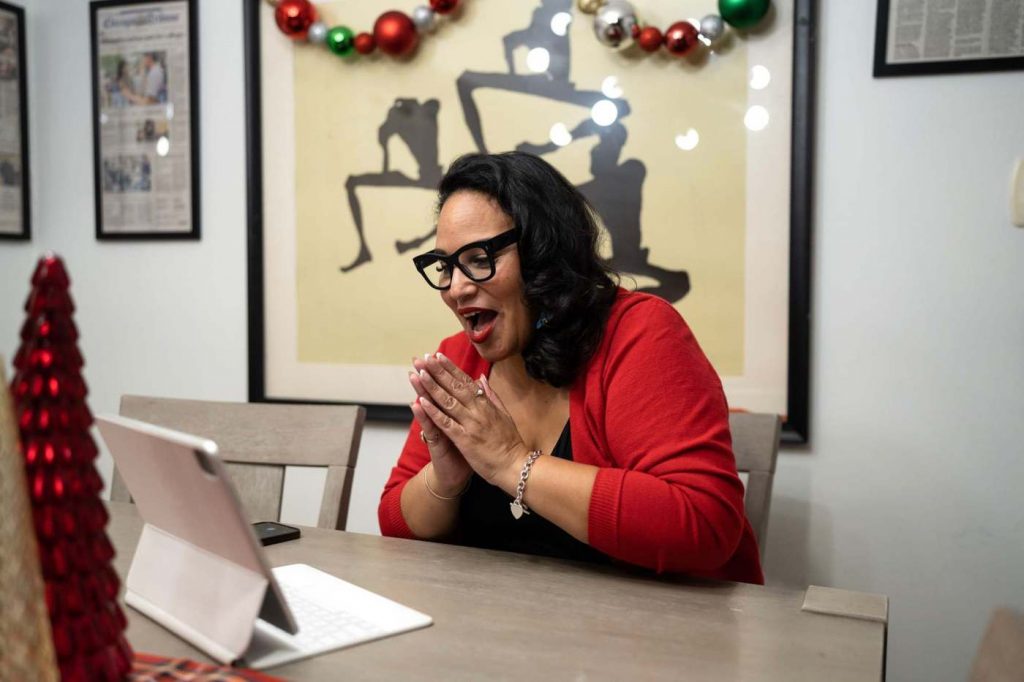CHICAGO — Since the end of 2019, Arlette Martin has not spoken to her daughter, who lives less than a 10-minute drive from her. In that time, her only child missed celebrating Martin’s 50th birthday and Martin wasn’t invited to her daughter’s wedding.
“I’ve never spoken to my daughter, hugged or touched her since New Year’s Eve 2019,” said Martin, of Peru, Illinois. “My ex-husband’s side of the family, she’s still in a relationship with them. It’s just my side of the family, she’s not.”
Over the years, Martin said, she attempted unsuccessfully to talk with her 29-year-old child through letters, emails and texts and by showing up at her residence.
Martin says she and other parents in similar situations with their adult children are falling apart because of estrangement, the voluntary act of having no contact or limited contact with a family member, or intentionally distancing oneself because of a negative relationship.
According to studies, parent-child estrangement happens much more with fathers than mothers. The estrangement often begins when the children are in their early to mid-20s. Daughters are less likely than sons to be estranged from mothers.
Joshua Coleman, a West Coast psychologist, says his practice has been completely taken over by estranged parents and has a monthslong waiting list. Coleman, author of two books on estrangement and an estrangement coach who offers webinars on his website, said many parents are suffering enormously because of this.
“Most of the time it’s the adult child cutting off a parent, not the other way around,” Coleman said. “Values of family have changed over the past half century. Ideas of ‘honor thy mother and father, respect thy elders,’ has given way to this perspective where the only relationships one is presumed to have are those which are more in line with one’s ideals about happiness, self-esteem and protection of one’s mental health. It used to be that parents wanted their children to respect, if not to fear, them. Now parents feel like they have to earn the children’s love and respect, particularly once they become adults.
“Today, nothing compels an adult child to have a relationship with a parent beyond whether or not that adult child wants that relationship,” Coleman said. “Those who do have a relationship with their parents, there’s more opportunity to put it into a growth, happiness, identity perspective, but parents who aren’t able to do that, or the kids who don’t have good communication tools, are more likely to end up in conflict or estranged.”
Martin worked with Coleman over the summer, trying to fix the severed ties with her daughter, to no avail. Martin said it’s now a waiting game, one where her daughter will have to come to her. Until then, Martin spends time with her 6-month-old great-niece and her 3-year-old Tibetan mastiff. She writes in her journal, puts in time at the gym and her local church. She attempts to distract herself by getting out of town to visit other family members. Martin is also looking forward to starting art therapy.
As days go by, Martin continues to hope her child reaches out. Martin’s daughter declined to comment for this article.
“That piece of my heart is still empty,” Martin said. “The holidays, I get more emotional. Christmas is difficult, but my niece assured me it’s OK to make new memories.”
Martin started a new holiday tradition by putting up a Christmas tree with her great-niece.
“A year ago, I couldn’t have sat here without constantly crying,” Martin said. “I am trying to move forward without her. I don’t know how I’m going to be able to stay in this community when my daughter finally has a child. I’m finding joy and happiness with my great-niece. … My sister and niece are wonderful at trying to share memories, but to miss out on that with my own daughter? How do you do that?”
Tina Gilbertson, a licensed professional counselor and author of “Reconnecting With Your Estranged Adult Child,” works with estranged parents through the Reconnection Club, an online school and support hub that offers workshops and forums where people can ask questions and connect with others enduring estrangement. She also has a weekly podcast.
“There’s nothing wrong with you inherently just because you’re experiencing this,” Gilbertson said. “There’s a lot of shame that comes up when we feel rejected. The people who do become estranged, it’s a difficult decision. It is based on these kinds of longer roots of problems that some people in the family might not have realized at all were that problematic. There may always have been different kinds of divisions in the family with temperaments, attitudes and values.
“But there’s maybe one person who feels themselves to be the black sheep or they take the brunt of it and they’re suffering more than anyone realizes. For them, if they do decide to put distance between themselves and family, it’s kind of a relief for them because there’s something in those relationships that is untenable. It’s often a shock for other family members. It’s important to recognize it’s not necessarily an overreaction. It’s possibly something that’s happened at the end of a long fuse — maybe an invisible fuse, but a long one.”
For Urban Gateways CEO Leslé Honoré, a poet, author and organizer, estrangement was a decision made out of self-love. She cut ties with three older half-sisters in 2018 after the death of their father. With his passing, Honoré said a lot of “untethering” occurred in the family.
“Once he was gone … it resurfaced things that I thought we had healed from and grown out of and we had not,” Honoré said. “When it started to affect my kids, that’s when I did a full stop. I could not allow my kids to live the cycle that I had lived through the majority of my life, which was a desire to be included, being excluded. I made a difficult decision to cease contact and to firmly say, ‘I wish you all good things and I also wish for you no longer to be in my life.’
“I love them enough to know that my presence in their life does not bring all of us joy. What has always given me strength is what is going to be healthiest for my children. I don’t lament estrangement. I am empowered by knowing that I, and more importantly my kids, can see that you are empowered to shape your life in any way that you need to.”
In the absence of blood relatives, a sisterhood of friends has fostered Honoré‘s growth and has become her chosen family. Honoré’s three children call eight women she made friends with at Xavier University of Louisiana the “Xavier Aunties.”
Honoré said the relationship with her chosen group of women is a loving and deep relationship where love and nurturing is done in the exact same way blood family does.
“I have women in the city that I’ve known for almost 20 years,” she said. “My best girlfriends, Angela and Rhonda, are sisters to me in every way, shape or form. Jessica (Gillespie) is my little sister. … This is my family. I am happy and fulfilled.”
Gilbertson offers advice to help with estrangement during the holiday season:
Use “I” statements in expressing how you feel rather than asking people to agree with you about how mean someone is being or how wrong they are to reject you, she said. Ask for empathy about how hurt you feel.
It is possible to support someone without taking sides. If you’re the person wanting support, let people know what you need, she said. Say, “I just need you to understand how I feel.”
Recognize estrangement is never solved by more estrangement. Insisting that “if the kids won’t talk to me, they can’t talk to their father either” makes the situation worse, she said.
Lower the emotional stakes during the holidays. The holidays are not the only, or even the best, time to reconcile a tense relationship. In many cases it might be better to wait until the new year, she said. Don’t imagine that if the holidays can’t fix this, nothing will; that’s not true.
Be prepared for tough conversations, she said. Know what you’re going to say if somebody says, “Hey, is so and so coming home for the holidays” or “Have you been in touch with so and so?” It’s OK to say, “It’s difficult for me to talk about; I’d rather not talk about so and so.”
Don’t imagine that you’re the only person brokenhearted during the holidays. Many people are dealing with estrangement. If you have an estrangement in your family, it doesn’t necessarily say anything about you, she said.
If you decide to reach out to someone you’re estranged from, do it before the holidays. There’s so much about estrangement that you’re not in control of, especially when it’s not your decision, that you want to take control of the things that you can control, she said.
Accept that you will have emotions and uncertainty during the holiday season: grief, resentment, sadness, anger, a sense of betrayal, rejection. Just acknowledging that there’s no fix for feeling bad might remove a bit of extra suffering, she said.
Cynthia Ashley, Martin’s therapist and a licensed clinical psychologist practicing in LaSalle, Illinois, said she always recommends the person severing ties to email or write a letter, telling the other person why they are disconnecting from the other. If there is any hope of reconnection, they can also stipulate what their conditions are to renew a relationship.
“People like Arlette reach out, do everything they can, and if that child is not willing to reconnect and has not given a parent any reason for the disconnection, the process of acceptance has to start,” Ashley said. “You’re not letting go of the child, you’re trying to let go of the pain you’re in. Maybe it will get better, but you have to move on with life. If (reconnection) happens, seek ways to ensure that the bond becomes solid again.”
©2023 Chicago Tribune. Visit at chicagotribune.com. Distributed by Tribune Content Agency, LLC.


